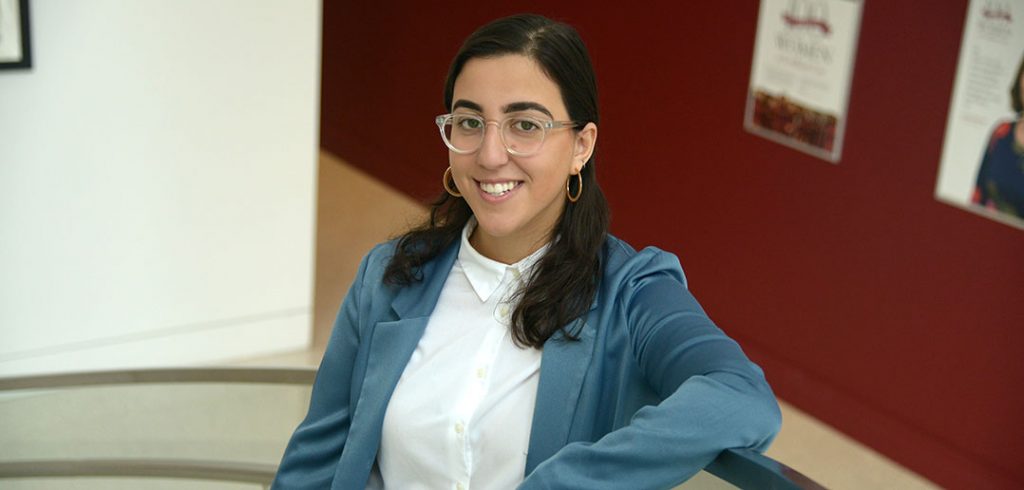“I can’t think of a greater deprivation of somebody’s liberty than taking their kids away from them,” said Leena Widdi.
Widdi, a lifelong New Yorker who is earning a J.D. from the School of Law, has zero tolerance for injustice. A Stein Scholar and board member of the Fordham Law Defenders and the Coalition of Concerned Students, Widdi has accepted a position upon graduation with the Bronx Defenders, where she will represent parents accused of abusing and/or neglecting their children.
It’s an area of law that is sorely in need of rehabilitation, she said.
“People respect criminal defense attorneys because they know that our prison system is racist and classist, and that most people in jail are there for things they shouldn’t be in jail for, or because there are underlying reasons of poverty or mental health or addiction,” she said.
“But people don’t have the same understanding of the child welfare system.”
Seeing Injustice Up Close
Widdi, who grew up in Bay Ridge, Brooklyn, has a great deal of experience in the child welfare field. A 2015 graduate of John Jay College of Criminal Justice, she interned during her first year at Fordham Law at the Brooklyn Defender Services’ family defense practice, and the Bronx Defenders Family Defense Practice her second year. She noted that in four months, she could count on one hand the number of defendants who weren’t black or Latino.
“It’s not like other communities don’t use drugs, leave their kids unattended, have their kids get into accidents, or have mental health issues. But these poor communities don’t have the resources to protect against the state getting involved. They’re going to public hospitals, and they’re getting public benefits, so they’re always kind of being monitored.”
“When we see a mother of color letting her kid go to the park by himself, she’s probably ‘unfit’ to be a mother. But when it’s a white family in Park Slope, that’s just a parenting style, and you’re building independence.”
Seeking Alternatives to Foster Homes
Widdi doesn’t dismiss the fact that parents dealing with issues of mental health, poverty, institutionalized racism, and substance abuse can struggle to care for their children. But she doesn’t believe that removal from their homes is the answer, noting that children who are placed in foster homes are incarcerated more frequently and have more mental health issues.
“Instead of helping the family with the services that they need, which is what the child welfare system is required to do by law, they take a better-safe-than-sorry approach, and take a kid out of their home,” she said.
“Judges are not going to end up on the front page of a newspaper for taking a kid out of his home because they were being extra cautious, even though the effects of that on that family are monumental. But they will if a kid stays at home and ends up dead. It rarely ever happens, but of course it’s so sensationalized when it does.”
A Drive Inspired by Heritage
Widdi’s devotion to social justice has resonated both outside the walls of the Law School and inside it as well. She has pushed to have a space created where students who don’t live nearby can relax between classes, and as part of the Coalition of Concerned Students, she’s advocated that professors and administrators think about the ways that Muslims are portrayed negatively when discussed in the context of law. She chalks up her interest in social justice to her upbringing as the child of Palestinian immigrants.
“I go back home to Palestine as often as I can and see a lot of similarities between the injustices that happen there and what happens here every day, though on a different scope,” she said.
“In doing public defense, I am working against systems of racism and classism and misogyny, and so I’m doing my part, albeit indirectly, to help my own community.”
Inspiring Others to Pursue Family Law
Leah Horowitz, LAW ’06, director of student organizations and publicity at the Law School’s Public Interest Resource Center, repeatedly falls back on the word “phenomenal” to describe Widdi. She recently submitted Widdi’s name for consideration for the Law School’s prestigious Donald Magnetti Award, which is presented to a member of the graduating J.D. class in recognition of their outstanding public commitment and contribution to those beyond the Law School Community. When she asked for co-signers, 15 faculty members swiftly added their names to the nomination.
“People now know about criminal defense because of TV shows, and because there’s a lot of information about the injustices in the criminal defense system. But there are injustices everywhere, and I think that one of the amazing things that Leena has done is she’s shone a light on what’s happening in the child welfare system,” she said.
Widdi has also been a mentor to others, Horowitz said. Students routinely reach out to her and say ‘Leena told me I had to come see you,’ about practicing family law, she said.
“What I admire most is her level of commitment, her heart, her vision, and her love for people. She has a vision for something better in this society.”


